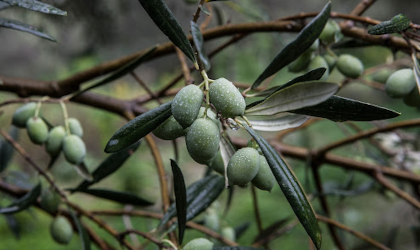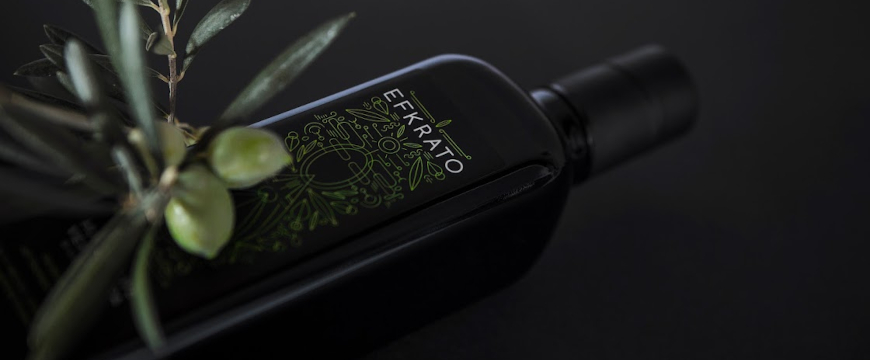In 2019, two cousins living outside Crete decided to honor their ancestral roots on the island by reinvigorating family olive groves full of the native ancient Tsounati variety olive trees. Their dream was to create a premium extra virgin olive oil remarkable for both its flavor and aroma, and the eco-friendly cultivation of the olives used to make it.
Emmanuel Vantarakis fondly remembers early childhood harvests in small family olive groves, where several generations and a donkey worked together, with breaks for traditional Cretan lunches under the trees. The aroma of fresh olive oil in the mill and the flavor of the newly-milled oil on bread stayed with Emmanuel and his cousin Andreas Venakis when they lived abroad and sampled the olive oil of various countries. This inspired the cousins to merge their family olive groves and create the EFKRATO brand. Emmanuel believes “it is fair to say that EFKRATO is the optimized version of the same pure olive oil we grew up with.”
Dozens of awards for its quality from New York to Tokyo, from Paris to Dubai, plus more prizes for their olive oil’s richness in polyphenols, testify to Emmanuel and Andreas’ success with the organic limited production early harvest extra virgin olive oil (EVOO) they named “EFKRATO.” This name comes from an ancient Greek word, "Εύκρατο," which consists of the components "εὖ" + "κεράννυμι." The second part means to mix, to combine, to regulate the temperature, while "εὖ" indicates the good properties of the second part. An ideal combination of factors such as the terroir, the cultural wealth of Crete, and painstaking care for their olive groves, olives and the entire cultivation and production process is reflected in the word “EFKRATO.”
EFKRATO is made from unripe (still green) olives that yield the healthier, higher phenolic early harvest olive oil which has been valued for its nutritious properties since ancient times. Recent scientific studies have confirmed traditional beliefs, showing that certain polyphenols (natural compounds found in early harvest EVOOs such as EFKRATO) are associated with antioxidant, anti-inflammatory, neuroprotective, and cardioprotective activity, among other health benefits.
EFKRATO is not mass produced; rather, it is a limited production EVOO created “without any compromise,” as Andreas says, in either quality or cultivation practices. The team that produces EFKRATO takes even more action to support biodiversity and sustainability than organic certification requires. In the small-scale Cretan family groves, they incorporate selected elements of natural farming and biodynamic and regenerative cultivation.
Their exceptional organic olive oil comes from non-irrigated, unplowed groves where prickly pear, wild asparagus, herbs, and various other plants grow, helping to prevent erosion, providing shade, improving soil quality and moisture management, and creating a perfect habitat for snails, birds, and insects. This biodiversity also helps control unwanted pests and pathogens. Moreover, compost and manure from the supervised grazing of local sheep support the gradual increase of soil organic matter, improving the resilience of the groves and gradually decreasing the need for any type of fertilizer.
The creators of EFKRATO, the Silvergreen company’s team, strive to understand, respect, and work with nature and its rhythms in order to pass on a healthy environment to future generations. The two cousins see their role as “helping the olive groves return to their optimal state, from which they have shifted as a result of uneducated or just plain wrong common practices,” as Emmanuel explains. They consider this “the exact opposite of the hyper-intensive cultivation of olive trees that we can find in other olive oil producing countries. It is also in line with the ancient history of Crete,” where the earliest archaeological evidence for use of olive oil has been found.
On the other hand, the EFKRATO team also employs the latest technology when it can benefit the environment, for example by using drones to apply regenerative agriculture applications. Compared to common application methods that utilize tractors, drones use less energy and water and emit less CO2, as well as avoiding damage to the natural habitat on the ground. In addition, the EFKRATO team cooperates with myClimate to underpin their environmentalist dedication, financially contributing to the organization’s work on eco-friendly projects.
Andreas believes that “if there are natural ways to achieve a goal, it’s unethical to be lazy and just use chemicals, at least in small scale production like ours.” Rather, we should “help nature do what it knows how to do on its own. Be ethical about the choices we make. We believe all of Crete could be an organic island. Crete can’t compete with other countries’ high density, cheap production, but in quality, which includes sustainability, culture, and tourism,” Crete can do a great deal.

Today, Emmanuel points out, only a small percentage of Greek olive trees are the Tsounati variety, partly because many Tsounati trees were replaced with the more productive, easier-to-grow Koroneiki trees. However, the cousins do not focus on what is easiest, but on what is most sustainable, best adapted, tastiest, and healthiest - best for humans and the environment. EFKRATO is a worthy representative of the culinary and cultural wealth of Crete.
EFKRATO oil is extracted from olives grown in the area around Rethymno in Crete. Careful attention to storage and transportation after an early harvest, individually selected olive fruits, and oil extraction as soon as possible after the harvest, help ensure its unique sensory and nutritional characteristics. As climate change increases October temperatures, refrigerated trucks are used to keep the olives cool on the way to the mill.
The early harvest yields an oil with a pleasant bitterness and pungency; these are harmoniously combined with aromas of green almond and artichoke, floral sensations, and a lingering aftertaste. EFKRATO is perfect on salads, greens, vegetables, and fish; it can transform even a simple dish into a special gastronomic experience.
To enjoy an olive oil tasting session in EFKRATO’s olive grove or at a collaborating restaurant, and taste both EFKRATO and other awarded representatives of the three main Cretan olive oil varieties, contact the EFKRATO team on Instagram, or visit their website.
Thanks to Antonis Tsoulos for the photos used with this article.
All businesses, organizations, and competitions involved with Greek olive oil, the Mediterranean diet, and/or agrotourism or food tourism in Greece, as well as others interested in supporting Greeks working in these sectors, are invited to consider the advertising and sponsorship opportunities on the Greek Liquid Gold: Authentic Extra Virgin Olive Oil website. The only wide-ranging English-language site focused on news and information from the Greek olive oil world, it has helped companies reach consumers in more than 220 countries around the globe.


